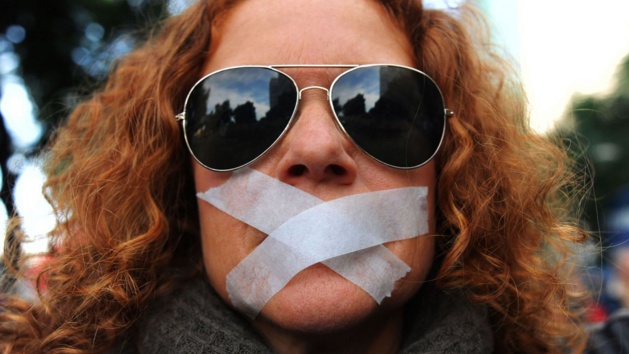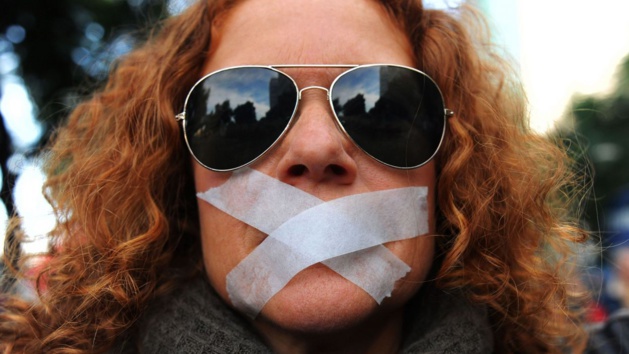
Credit Cristina Quicler – Belgaimage
It seems to endanger the Spanish democracy. According to a lot of Spanish people, it has been weakened since Mariano Rajoy’s government investiture that took place three years ago. On January 1st, the Spanish Parliament adopted the bill which was strongly contested by the people. This law, known officially as “public security law”, prohibits all kind of citizen protests. Seen as repressive by a lot of Spanish as well as the judiciary, many nicknames have been given to this law, each worse than the last. The most widespread is “gag law” or “ley mordaza” in Spanish, because it is considered as ludicrous by the people in a democratic system.
law”, prohibits all kind of citizen protests. Seen as repressive by a lot of Spanish as well as the judiciary, many nicknames have been given to this law, each worse than the last. The most widespread is “gag law” or “ley mordaza” in Spanish, because it is considered as ludicrous by the people in a democratic system.
 law”, prohibits all kind of citizen protests. Seen as repressive by a lot of Spanish as well as the judiciary, many nicknames have been given to this law, each worse than the last. The most widespread is “gag law” or “ley mordaza” in Spanish, because it is considered as ludicrous by the people in a democratic system.
law”, prohibits all kind of citizen protests. Seen as repressive by a lot of Spanish as well as the judiciary, many nicknames have been given to this law, each worse than the last. The most widespread is “gag law” or “ley mordaza” in Spanish, because it is considered as ludicrous by the people in a democratic system.
What does the legislation say?
This law was introduced by the Spanish Secretary of State for the Home Department, Jorge Fernandez Díaz, member of Rajoy’s government and of the Popular Party (PP - conservative and liberal right wing) that is heading the government for 4 years. Theoretically, the law stipulates penalties towards various forms of citizen protests, without any distinction. The law prohibits for instance every kind of insult to the nation or the State symbols such as the flag. If this occurs, it can lead to a fine up to 30,000 euros. Besides, it also prohibits manifesting around public installations such as the Senate or the Congress (lower chamber of Parliament). A lot of specialists see this legislation as a reaction to the independents movements, and specifically to the massive movements claiming the independence of Catalonia which is one of the 17 autonomous communities of Spain.
such as the Senate or the Congress (lower chamber of Parliament). A lot of specialists see this legislation as a reaction to the independents movements, and specifically to the massive movements claiming the independence of Catalonia which is one of the 17 autonomous communities of Spain.
 such as the Senate or the Congress (lower chamber of Parliament). A lot of specialists see this legislation as a reaction to the independents movements, and specifically to the massive movements claiming the independence of Catalonia which is one of the 17 autonomous communities of Spain.
such as the Senate or the Congress (lower chamber of Parliament). A lot of specialists see this legislation as a reaction to the independents movements, and specifically to the massive movements claiming the independence of Catalonia which is one of the 17 autonomous communities of Spain.
This analysis seems to be consistent regarding the moment that the government chose to introduce the bill. Indeed, The Secretary of State for the Home Department introduced this law on the 29th of November of 2013, after months of great mobilisations supporting the Catalan independence will. It is clear that citizens’ protests have largely increased these last years, concerning for example the government’s management of the crisis.
This new legislation establishes 31 types of “serious” breaches which could put oneself at risk of a 30,000 euros fine. Seven types of breaches seen as “very grave” could put the perpetrators at risk of a fine of 600,000 euros ceiling. Those violations concern in practice public order offences during sport events or demonstrations during the “reflection day”. This day corresponds to a period of time predefined during the elections. It was supposed to allow the citizens to make their choice without any external influence. This reflection day would justify the penalising of the manifestations during such period. This new law determines new fines that could be up to 600,000 euros for transgressor citizens.
Strong rejection in Spain: a law which is characteristic of a system
The reactions are very strong among Spanish citizens and especially among young Spanish people whom the Journal International interviewed: there is a very strong indignation towards this law. Basically, they are unsatisfied with the PP. A lot of the Spanish people notice a common repressive feature to the laws adopted by the government. In addition to this law on the “public security ”, Rajoy’s government has increased controversial laws within the country as well as abroad since its taking office. It is important to remind that it is the same government which had propose to suppress the abortion right in 2014. The project has finally been given up. Magdalena, a thirty years old Spanish woman who considers the “gag law” as a characteristic of an antidemocratic system, even says: “This is worse than the Francoism. At least, during the Francoism, we knew that we were living in a dictatorship.”
”, Rajoy’s government has increased controversial laws within the country as well as abroad since its taking office. It is important to remind that it is the same government which had propose to suppress the abortion right in 2014. The project has finally been given up. Magdalena, a thirty years old Spanish woman who considers the “gag law” as a characteristic of an antidemocratic system, even says: “This is worse than the Francoism. At least, during the Francoism, we knew that we were living in a dictatorship.”
 ”, Rajoy’s government has increased controversial laws within the country as well as abroad since its taking office. It is important to remind that it is the same government which had propose to suppress the abortion right in 2014. The project has finally been given up. Magdalena, a thirty years old Spanish woman who considers the “gag law” as a characteristic of an antidemocratic system, even says: “This is worse than the Francoism. At least, during the Francoism, we knew that we were living in a dictatorship.”
”, Rajoy’s government has increased controversial laws within the country as well as abroad since its taking office. It is important to remind that it is the same government which had propose to suppress the abortion right in 2014. The project has finally been given up. Magdalena, a thirty years old Spanish woman who considers the “gag law” as a characteristic of an antidemocratic system, even says: “This is worse than the Francoism. At least, during the Francoism, we knew that we were living in a dictatorship.”
This comparison can be seen as a bit excessive, but this issue is not an isolated case in the citizens’ mind. It seems that since the government’s arrival, citizen’s dissatisfaction is constantly increasing facing antidemocratic and extremely repressive law texts such as the law that deprives every Spanish living abroad for more than three months from any social rights. A climate of global discontentment with the government that is reigning in Spain and more generally with the country’s political life.
The law came to be controversial in other countries as well. From a legal point of view, Nils Muiznieks, European Commissioner for Human Rights, considers this legislation as unacceptable in a democracy. He recently declared: “We wonder if these restrictions are necessary in a democracy.” This law seems above all to contribute more to the disgrace that the PP, victim or responsible depending on the different opinions, is facing. Unavoidable political phenomenon, Podemos (new left wing party), has been emerging for more than one year in Spain, and is threatening the Spanish two-party system dominated by the PP and the PSOE (Spanish Socialist Workers Party) since the end of the dictatorship. The opinion polls are already announcing its victory at the next municipal elections. This law could have had a major impact on the Podemos success, and especially on the citizens’ indignation facing a government which is always more conservative and repressive. Although it does not allow predicting Spain’s politics future, this new “public security law” seems to prejudice significantly the democratic principles of a country in mutation which is still suffering from the violent consequences of the crisis.
Spain’s politics future, this new “public security law” seems to prejudice significantly the democratic principles of a country in mutation which is still suffering from the violent consequences of the crisis.
 Spain’s politics future, this new “public security law” seems to prejudice significantly the democratic principles of a country in mutation which is still suffering from the violent consequences of the crisis.
Spain’s politics future, this new “public security law” seems to prejudice significantly the democratic principles of a country in mutation which is still suffering from the violent consequences of the crisis.




























